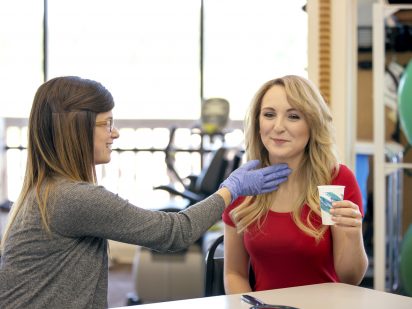Speech disorders can happen to anyone, young or old.
According to the American Speech-Language-Hearing Association (ASHA), both children and adults can develop speech and language disorders – when a person is unable to produce speech sounds correctly or fluently or has problems with their voice or resonance.
Speech disorders can include:
- Aphasia
- Fluency/stuttering
- Pragmatics
- Dysphagia
- Dysarthria
- Voice production
- Cognitive deficits
Children, by a certain age, develop particular speech and language skills. When it takes longer to learn those skills, there may be a problem, ASHA said. Meanwhile, for adults, some speech and language disorders can start in childhood while others happen in adulthood after an illness, such as dementia or cancer (laryngeal or oral), or injury (traumatic brain or right hemisphere brain injuries).
The Speech Language Pathology team at Trinity Health, which includes Nadine Hagen, MS, CCC-SLP; Shanda Frantsvog, MS, CCC-SLP; Kristy Burchell, MA, CCC-SLP; Linnea Maxfield, MS, CFY-SLP; Devin Rearer, MA, CFY-SLP; and Malia Dolan, MS, CCC-SLP, see a fairly equal amount of pediatric and adult patients with hearing and speech issues.
Some children can’t produce speech sounds while others have difficulty expressing themselves vocally and in writing as well as organizing thoughts, Hagen explained. “To overcome learning challenges, the speech language pathologist helps individuals at any age develop and demonstrate communication skills to better participate in various communicative settings, follow instructions, and improve reading and writing skills.”
While children receive the assistance of a Speech/Language Pathologist privately or in schools to address all needs of communication, adult patients are treated in an outpatient rehabilitation setting.
Speech language pathologists offer the following services:
- Screening: An informal and limited evaluation of an individual with a suspected disorder to determine whether further assessment should be conducted. A physician’s order is not needed, and a patient would not be billed for this service.
- Evaluation: A thorough evaluation of speech and language skills using standardized test measures and/or informal testing procedures. Voice evaluations are conducted using perceptual analysis. Swallowing evaluations consist of clinical evaluations at bedside and modified barium swallow evaluations conducted in the radiology department.
- Treatment: An individualized therapy program to improve communication impairment and/or swallowing problems. A physician’s order is needed for most third-party payors.
- Patient-family education: Information relevant to the patient’s communication disorder and/or dysphagia. This may be provided in conjunction with the screen, the evaluation and/or the treatment.
- Community education: Information relevant to communication disorders and/or dysphagia to the general public.
“Family and friends play a vital role in the success of speech therapy,” Hagen said. “Speech language pathologists work with a team of family and other professionals to determine individual goals for the patient.”
Patients will require a physician’s referral. For further questions or for a free screening, please contact your local Speech Language Pathologist. Trinity Health Outpatient Speech Language Pathology in Health Center-West can be reached at 701-857-5286.

